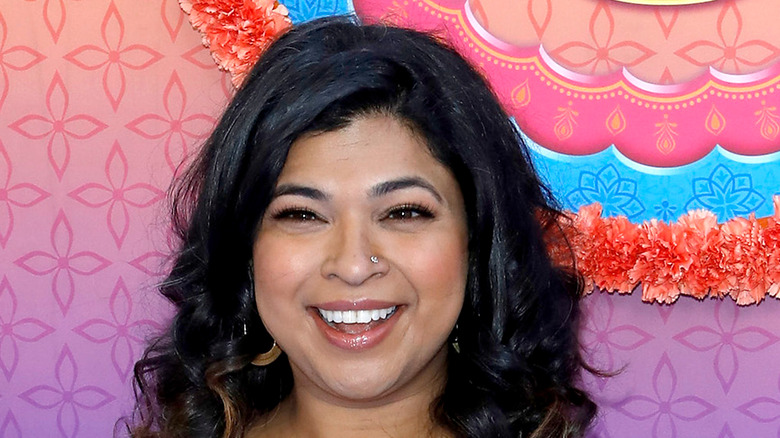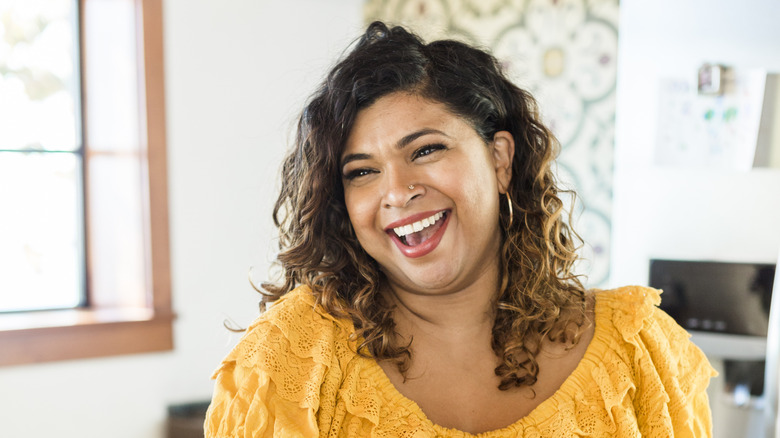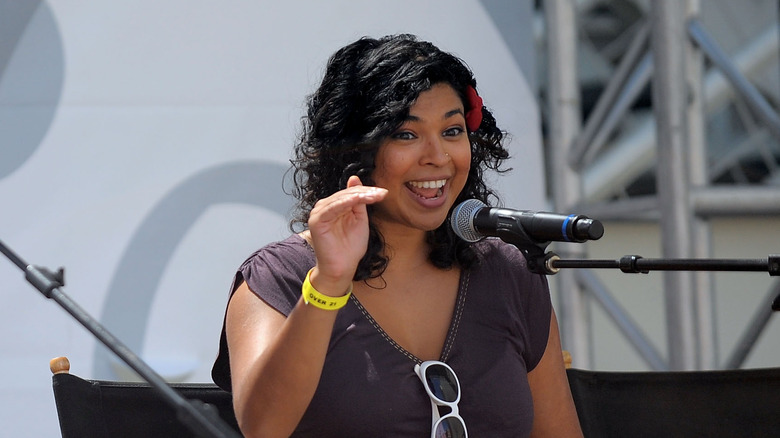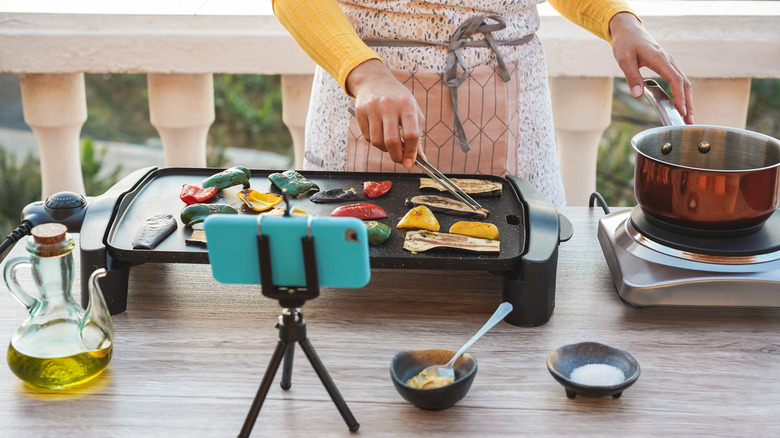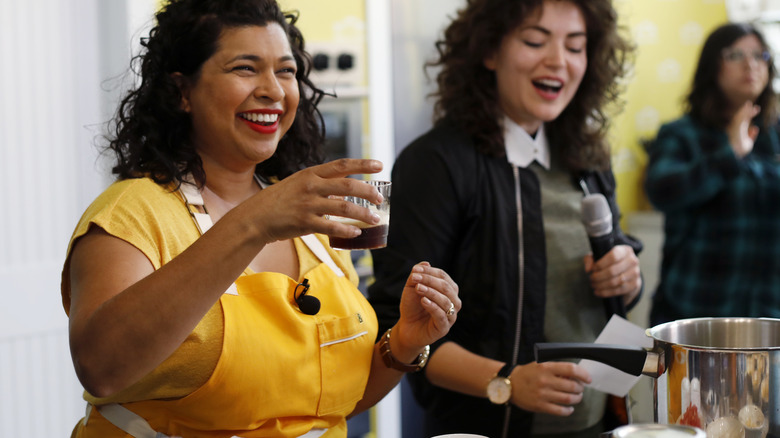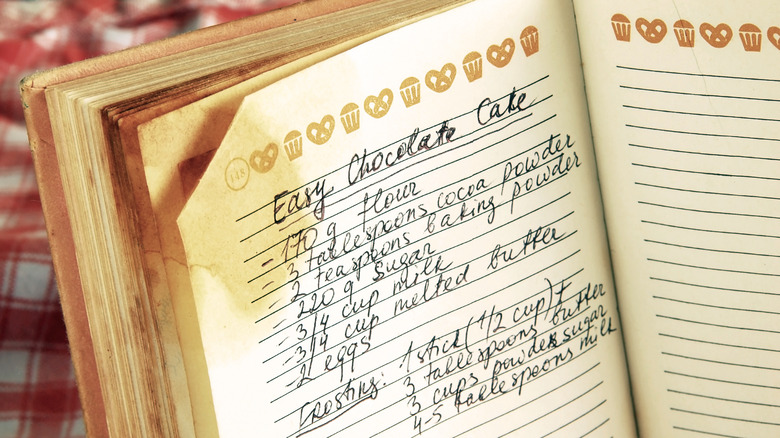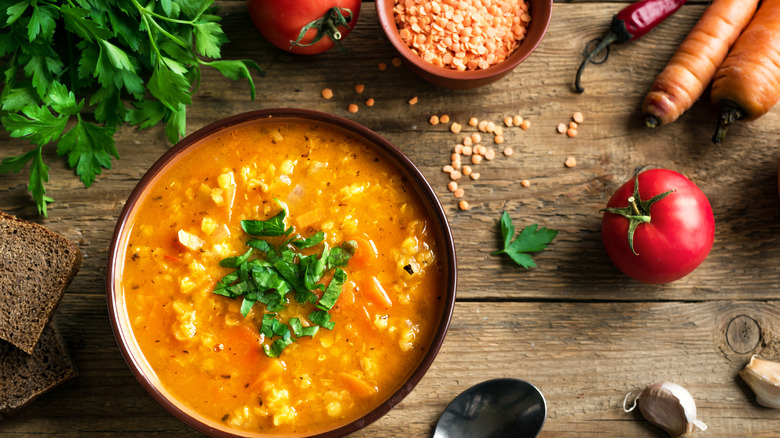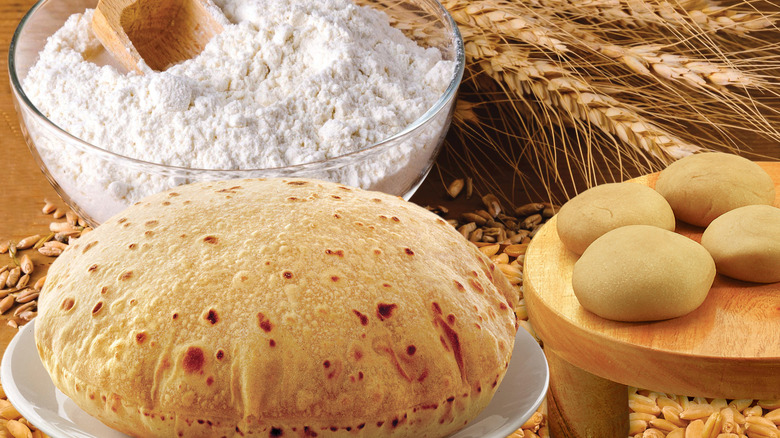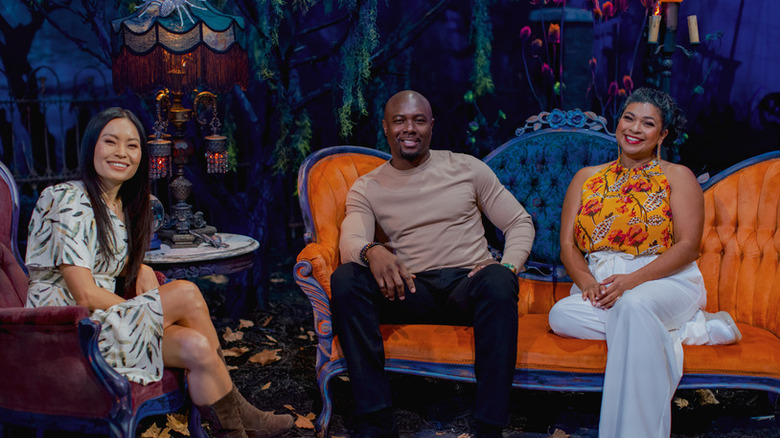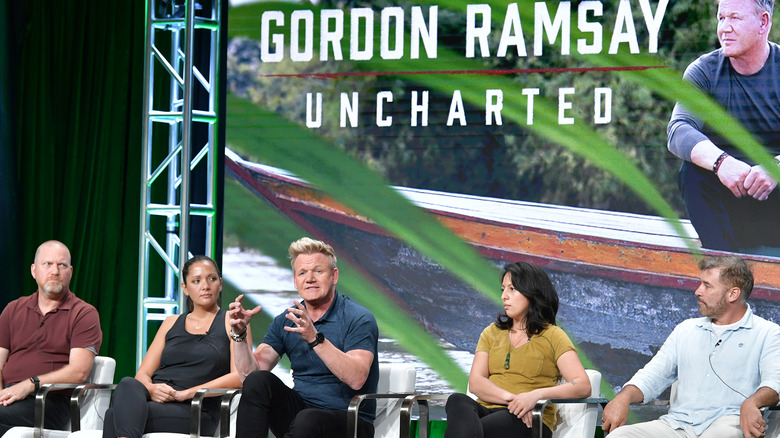Aarti Sequeira Talks Food Network And My Family Recipe Journal - Exclusive Interview
We may receive a commission on purchases made from links.
Food was always near the center of Aarti Sequeira's life growing up, but it might come as a surprise to many who follow this chef, "The Next Food Network Star" winner, cookbook author, and general all-around foodie that for many years, Sequeira's professional life had nothing to do with cooking. In fact, she studied journalism and worked as a TV producer for a number of years. And with a successful media career unfolding before her, it was entirely plausible that she'd never make the pivot to the culinary world.
But that was before the passion she had felt for food when cooking beside her mother returned, crystalized by two specific "Aha!" moments, as the chef told Mashed during a recent interview. She also dished on how her uniquely international life influenced her cooking — she has both moved about the globe and lived in decidedly global places, such as Dubai, of which she said: "I had a friend from Madagascar, I had a friend from New Zealand, I had a friend from Slovenia" — on the challenges of cooking for the camera, on her favorite dishes to cook, and about the recipes that weave her life together with the lives of family members past and present.
As you'll see, like food, family is another thread stitched throughout every aspect of Aarti Sequeira's life — so much so that her latest project is launching a cookbook, of sorts — "My Family Recipe Journal" — that will encourage you and your family to record your own cherished recipes and, along with them, the memories they bring simmering up.
For Aarti Sequeira, an interest in cooking began in childhood
When did you first start cooking?
So I probably first started cooking when I was, I would say, about 10 or 11. My incentive was that I was kind of a chubby child with a gigantic sweet tooth. And so my mom didn't keep any goodies at home. There were no cookies, there was no ice cream, there were none of those things. And so, I defiantly was like, "Well, then I'm going to learn how to make them." And so on Fridays, which was the day of rest in Dubai, my mom would make this massive lunch of fresh fish from the market. She'd make fish curry and rice and vegetables. And then my mom and dad would take a nap, and I would go and bake. And so by the time they woke up from their nap at around 4:00, there would be a big pot of hot tea and whatever baked good I had managed to scramble together, and clean the kitchen too.
And so, that kind of was how I started. Baking was such a great way for me to do that, A) because it satisfied my cravings, but B) because baking is such a science. And so you have to follow the recipe and in doing so you kind of learn about the basics of cooking.
Did you have any early inspirations, be they from famous cooks, cookbook authors, Food Network personalities, or the like?
Oh, well, when I was younger, it was my mom really, because I come from a long line of really great cooks. My grandmother, my mom's mom, there are so many stories about the way that she cooked. They grew up in a time of very little. There were multiple wars and so there were times of rations. And so my mom and her sisters always tell me stories about how she would make anything with [very little]. She would bake a cake without an oven on the stove. She would steam dishes without a recipe. She would take day-old rice and turn it into a sweet rice with raisins and nuts to sort of extend it another day and make it feel like a treat for her kids. And so that's the lineage that I come from. And so, that was always an inspiration to me.
The international influence of Aarti Sequeira's cooking
How has your decidedly international life influenced your cooking?
It particularly [started with] my mom, because here she was living in Dubai, in a country, not very much like the one she'd grown up in, with her daughter attending a British school. All of my friends were from all over the world. And so when they would come over after school, she was constantly trying to bridge that gap between Indian food and culture, and these other cultures that were coming over. My mom has such a curious palette. She doesn't just make Indian food. She went to hospitality school in England, and we traveled all over the world. And so whenever she cooked, it was sort of this synergizing of experiences and curiosities and research and stories all coming together on the plate. That style of cooking that has such a strong story behind it is how I cook, and that's what energizes me and excites me about cooking.
I think because I grew up in a place where I had a friend from Madagascar, I had a friend from New Zealand, I had a friend from Slovenia, I think I realized that we are all so much more familiar, so much more similar than we are different. That shows up in some of the things that we cook. Almost every culture has some version of a stuffed fried bread. Because there's something about humanity that says, "yum, yum, let's fry it."
And so I'm always looking for those similarities because I think it helps us to recognize how connected we are and what one big family we are. But also to celebrate the differences, the new cool ideas that other cultures have had when it comes to food and how sometimes eating another culture's food is such a beautiful doorway into understanding their culture, their priorities, their history, their geography, all those things. And so, that definitely colors the way that I cook in terms of finding new ingredients. Sumac for example, I want to do all the research possible to find out how that ingredient came to be and why it is that they use it so much in let's say, I don't know, in Israeli cooking. Those are the things that I'm just really fascinated by because again, it's a story.
How Aarti Sequeira started her cooking career
When did it become clear to you that cooking was going to be more than a hobby, it was going to become more of your life's work?
Well, there were two little moments. One was I was doing this cooking program, the semi-professional program. I remember I was cooking and the teacher had said, "Hey, you did great there. How'd you know how to do that?" I remember one of my answers was, "Well, I was watching Food Network and they told me to pat the steak dry before I put it in the pan." So I knew that all this stuff that I had been watching was now being absorbed into my muscle memory.
But shortly thereafter, I started my own YouTube cooking show and it was a cooking variety show. That was what I sort of felt comfortable with, this idea of I'm sharing the stage with people who have a similar passion, maybe not in cooking, but they have a passion for belly dancing or juggling or whatever it is, or music. Because of that, someone hired me to make cooking videos for them. I remember having a camera crew in my teeny tiny little studio apartment in LA, and the lights were on and they were just adjusting everything. I remember standing there going, "Oh my gosh, I'm getting paid to do this. This is crazy." I think that was the moment where I thought, "Okay, this could be a real career for me." And that was it.
Aarti Sequeira dishes on the challenges of cooking for the camera
What are the challenges of cooking on TV versus cooking when you're in your own comfortable kitchen?
Okay. There are a couple. Well, one of them is, it's kind of a silly one but it comes up a lot, is that when you are chopping an onion or you're using your immersion blender in a sauce, you're not smiling. You're just sort of focused. For me, I have a resting frown. It's a Sequeira thing. My dad has a frown when he sleeps even. That was one thing that I had to learn, was not to look so mad while I was cooking. I still remember one time I was making a chicken tikka masala sauce, and I was using the immersion blender, and I was really focused on it because I didn't want to scrape the bottom of the pan and I wanted to get it nice and smooth. Even as I'm talking to you right now, I can feel the frown in my forehead. My executive producer was in my ear and he said, "Less grimacing, please," and I started laughing. So that is definitely different.
Another thing is that I had so much practice talking and cooking at the same time just because so much of my early cooking years were cooking for friends and they would come over. Especially in our 20s, it wasn't like there were a bunch of my friends who could cook. So quite often I was cooking for them and they were hanging out and helping. And so, that was really good practice. But having this sense that we were cooking on a clock when we were shooting, whether I was shooting my cooking show or definitely when I'm cooking in competition, that sense of that clock is kind of foreign to how cooking transpired pretty much our entire lives.
I am really fascinated watching videos now on YouTube of people cooking the traditional way that people have always cooked, and it's over an open flame, there's no food processors, there's no blenders. People are grinding things, particularly Indian food, by hand on a stone. There's this sort of very methodical, meditative quality to cooking that I think is a gift. It's meant to be this great unwinding at the end of the day that is a soothing moment for our soul. And so, to cook in that way, you just have to have a different mindset about it altogether.
The most exciting moments Aarti Sequeira has experienced cooking on TV
What has been the most fun you've had on a cooking show so far?
Oh gosh, it has to be — oh my goodness, there are so many! Shooting "Grocery Games" with my friend Carl Ruiz, who passed away a couple of years ago, was always fun because even when it was a cooking competition and it felt like it was the most important thing in the world, he had a way of injecting humor into it and lightening the mood. And so anytime that I got to shoot with him was probably the most fun on set I've ever had. Alternatively, when I shot "Cutthroat Kitchen" and I think I was six months pregnant with my youngest, I ended up getting paired up with Cat Cora and we were both on the same set of like, I don't know if they were skis or snowboard skis. I have no idea. I don't do these things. But in that moment, it wasn't just the two of us tied up together. It was the three of us tied up together, me, her, and a baby between us, trying to cook stew at the stove and carry hot food back to our stations. She was so cool and so gracious about it all. That's really one of my favorite memories.
What are some of the biggest challenges that you've had on a cooking show so far?
I think on "Food Network Star," towards the end, the challenges get harder and harder. One of them was an "Iron Chef" challenge. I remember turning the corner and seeing Bobby Flay, who I've been cooking for all season, but also Michael Symon and Morimoto San. I was like, "What is happening right now?" That was definitely a ridiculous moment where I thought, "Now, how am I going to impress these guys who literally can make some of the best bites you've ever had in your life?" Blessedly, I managed to win that one, but that was definitely one of the hardest challenges I've had so far.
Why Aarti Sequeira created My Family Recipe Journal
What inspired you to work with DaySpring to create the recipe journal, and how do you hope people will use it this holiday season and going forward?
Family is a really big deal to me, as I think it is to most people. I think one of the things that's happened over the years, and it's happened particularly to me, is that I think families are moving away from each other. And so, there's a separation that is happening based on space, but also over time. And so I think that we're trying to keep that connection alive. We're trying to keep our memories alive and thereby keep that legacy and that lineage alive. One of the ways that I think we always do it is through food. I think that's why Thanksgiving is such a huge holiday for people because it's about the food, but it's not really. It's about stuffing, but usually, it's about Aunt Marcy's stuffing. It's about the characters that are attached to the food that comes to the table.
And I know that people are struggling in this time when there's just so much information, there are so many recipes, there's so much to take in, and time is whizzing by and we're forgetting these things. So I wanted to be part of the solution for that, which is to create a place where you can, with a very simple thing, with a piece of paper and a pen, you can preserve that memory and you can preserve that legacy and that person in your family or in your circle. I had a "framily" when I lived in LA, which was friends who were so close to me, they were like family. By writing those recipes down and sharing them with each other, that's a way to keep yourself connected over time and over space. So I have a recipe journal of my own. My grandmother, the one who was the incredible cook, she passed away when my mom and her sisters and her brother were very young and she hadn't had a chance to write all of her recipes down.
And so that inspired my mom to keep her own recipe journal where she has written down every recipe tried and true that we have eaten growing up. And so I know that — I can't think about that day when the good Lord takes her — that I will have that recipe journal in her handwriting, and that will be a way for me to connect to her even though she's not here anymore. Because of that, I created my own recipe journal. I've had it — it's an old day planner — it says 1988 on the front of it. I could see my handwriting change from child to adult. In there are recipes that I've collected along the way, and it's the kind of thing that I want to pass on to my children. And so, in that way, when I get the recipe journal from my mom, I can share it with my children who don't get to spend that much time with their grandmother because she's in India and we're here. But it's a way to connect them and give them this familiarity with my mom, with our particular family history, with our place in our culture, and our place in the world. It's sort of this really small, simple, humble little treasure that bears such huge implications for every generation going forward.
Aarti Sequeira's favorite family recipe
If there was one recipe, whether it's from your grandmother's, your mother's, or from your own recipe journal, that you could share with all the readers, share with the world, if you will, what would that recipe be?
It would be my mom's dal. It's the red lentils that were on our table every week. And it's one of those things that when my mom comes to visit, unfortunately, I put her to work pretty quickly and I tell her to make dal because even though I follow her recipe, there's something about her making it that I haven't quite mastered yet. I remember asking her, I said, "Is it something about the recipe?" And she said, "Well, maybe." Then she said, "But also, I've been making it for 50 years." Because when you've been making it for 50 years, you will make it your own.
I think that the beauty about the recipe is that you can't hurry it up. There's so much in our life that we've figured out a way to make more convenient and hurry up. I was waiting for a file yesterday to download and it took five seconds and I had to breathe through it. I was like, "This is taking forever!" But mastering a recipe takes years and years and years. And there is so much joy in making it over and over again. My mom's lentil is definitely one of those recipes.
Aarti Sequeira's favorite foods to cook
What is your favorite type of cuisine to cook? And what's your favorite type of cuisine to eat?
It changes all the time. I think my favorite type of cuisine to eat is sushi just because there is so much technique and wisdom that goes into slicing and preparing that fish and the rice and everything that goes along with it that I'm so hopelessly behind on that. I don't think I could ever master it. And then favorite cuisine to cook, gosh. Anything with spices, anything that has layering of spices, whether it's Indian, Moroccan, Middle Eastern, there are aspects of Szechuan cooking that use spices that I love. Anything with spices to me. I don't know what it is. My pupils dilate and I get really excited about it.
Do you have a single favorite dish to make?
I think chapatis, and for the same reason. I remember making chapatis with my mom when I was little. I remember standing by her elbow and we would make fun of each other for the different shapes we were making and what continents they looked like instead of being perfectly round. That's sort of a treasured memory for me. I remember going back to Mangalore in India where I'm from, and my grandmother, my dad's mom, making chapatis and putting them next to me and then she'd put freshly churned butter right next to me as well. And she'd just kind of pinch my cheek, and it was her little love language moment for me. And then these days I have two girls. They're seven and five, but shortly they'll be eight and six. When I make chapatis they run over to me and pull out their little rolling pins and start rolling the dough next to me. They're so excited to be part of that whole process. So I think chapatis are my favorite thing to make.
Is there a dish you just can't stand preparing when people ask you to make it?
I try to have a lot of patience about things like chicken tikka masala and butter chicken. I've seen some Indians get very frustrated about that being the only dish that people know. I think because when I grew up in Dubai, there were cultures that I wasn't exposed to and it wasn't until I came to the states that I got to meet people from these parts of the world or from these religions. And I was like, oh. I didn't know that much about them because I just hadn't been exposed to it. Okay, the only thing that I don't really like cooking is okra. My mom has tried every single way to make me like it, and I don't. I just can't. But when it comes to things that people ask me for recipes for, it tends to be things like chicken tikka masala and butter chicken. I just think, "How wonderful, this is going to start you on your journey into Indian food, so here you go."
Aarti Sequeira dishes on the new season of "Halloween Wars"
What's it like being on "Halloween Wars"? What have been the most fun aspects, the surprises, and what's it like behind the scenes there?
Gosh. The set itself is incredible. It really sets the mood and the tone of the whole thing. There are tons of little crannies and little details, the gravestones, the cobwebs. You have to see this photo of me sitting on a bench next to a skeleton that's laughing and I'm sitting there laughing next to it! Those are the things that don't get enough time on the show. But the set is a character in and of itself.
I think the thing I was constantly blown away by was what these competitors were capable of doing with sugar and chocolate. The things that felt either like a piece of art or felt like a realistic sculpture that you'd find in biology class when people were doing horses and you could see the musculature, the flare of the nostrils, those sorts of things. That just blew me away constantly. And then on top of that, there was such tremendous bakers who were creating moist, flavorful, really interesting cakes, some cakes I'd never had before. There was this Russian teacake with 15 layers or something that one of the bakers managed to do in that time that I thought was incredible.
And it was just that I felt like I was just walking into a museum or some sort of art show constantly and just cheering for them and just being in awe of what they were capable of doing. So that was really fun. And obviously sort of messing around with Eddie and Shinmin was also fun. It's a long day. You really have to like the people that you're going to hang out with because the bake is seven hours. So we come in a few hours before that because we're getting ready, and then we come out, we issue the challenge and then we're checking in over the course of those seven hours. But really it's really up to the bakers. And so, those were definitely some long, long days.
There's such a small number of people that can do what these guys do in the country, maybe in the world. And so they're all fans of each other and I think they're all learning from each other. The cool little tricks with the corn silk or dipping pasta in specific substances to make it look a certain way. All these little tricks, they were all watching each other and wondering, "How did you do that? How did you do that?" They probably don't get that many opportunities to do that.
In terms of any competition show, I know having been through "Food Network Star," there's such a small number of people that have gone through that specific thing where you've been under this time pressure, and then you're standing there and people are judging you and they're either lifting you up or crushing you. It's very specific and it's very bonding. And so, my goal always as a judge is to be fair and to be honest because I know when I'm on the receiving end, I don't want someone to not tell me the truth about what I've made. I want to know where can I improve and where did I do well. And so, that's always my attitude when I walk in.
The chefs Aarti Sequeira admires
Who are some of the other chefs who you most admire today?
Oh, yeah, I really love what Gordon Ramsay is doing with "Uncharted." I love this idea of going to another country and understanding what makes them tick. Why this ingredient? Why do you eat eel? I think that was the New Zealand one where they catch eels. That to me is so fascinating. I think the cool thing about that show is that Gordon, who is pretty indomitable, is in these situations where he's literally falling on his butt into a river because he couldn't catch the eel. So it's kind of disarming and makes him feel like a real human being. I love that about him and that show. I've just learned so much about cooking from his videos and stuff.
I've also learned a lot from Antonia Lofaso and Alex Guarnaschelli. They've really become people I go to when I need help with things, when I need advice. Because they're women in an industry that traditionally has been populated by men, and women who have risen to the top of their industry but have never — how do I put this in a way that doesn't sound bad? — but have held onto what makes them women, you know what I mean? They're strong and they're fearless and they're unbelievably talented, but they're also kind and compassionate and helpful. I just could eat them up with a spoon. They're like two of my favorite people in the world.
Order a copy of Aarti Sequeira's "My Family Recipe Journal" from DaySpring or Amazon and be sure to catch her on new episodes of "Halloween Wars" on Food Network.
